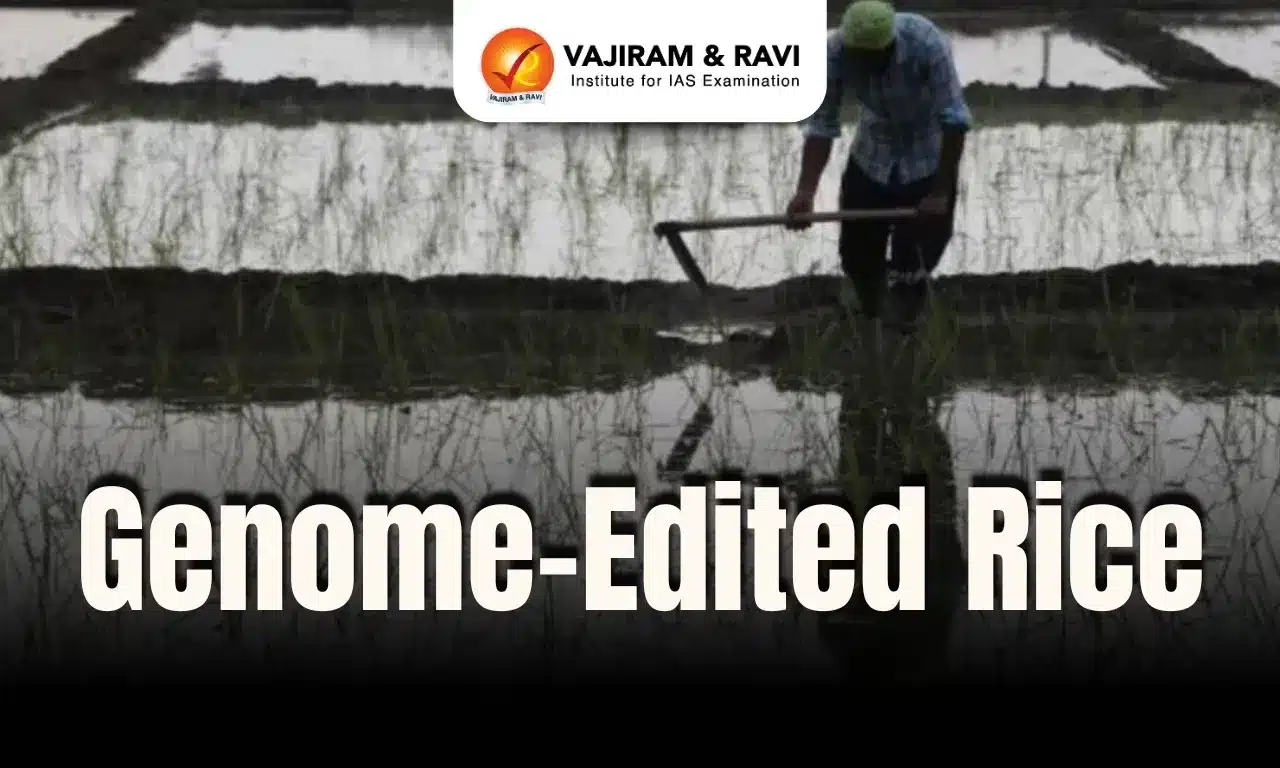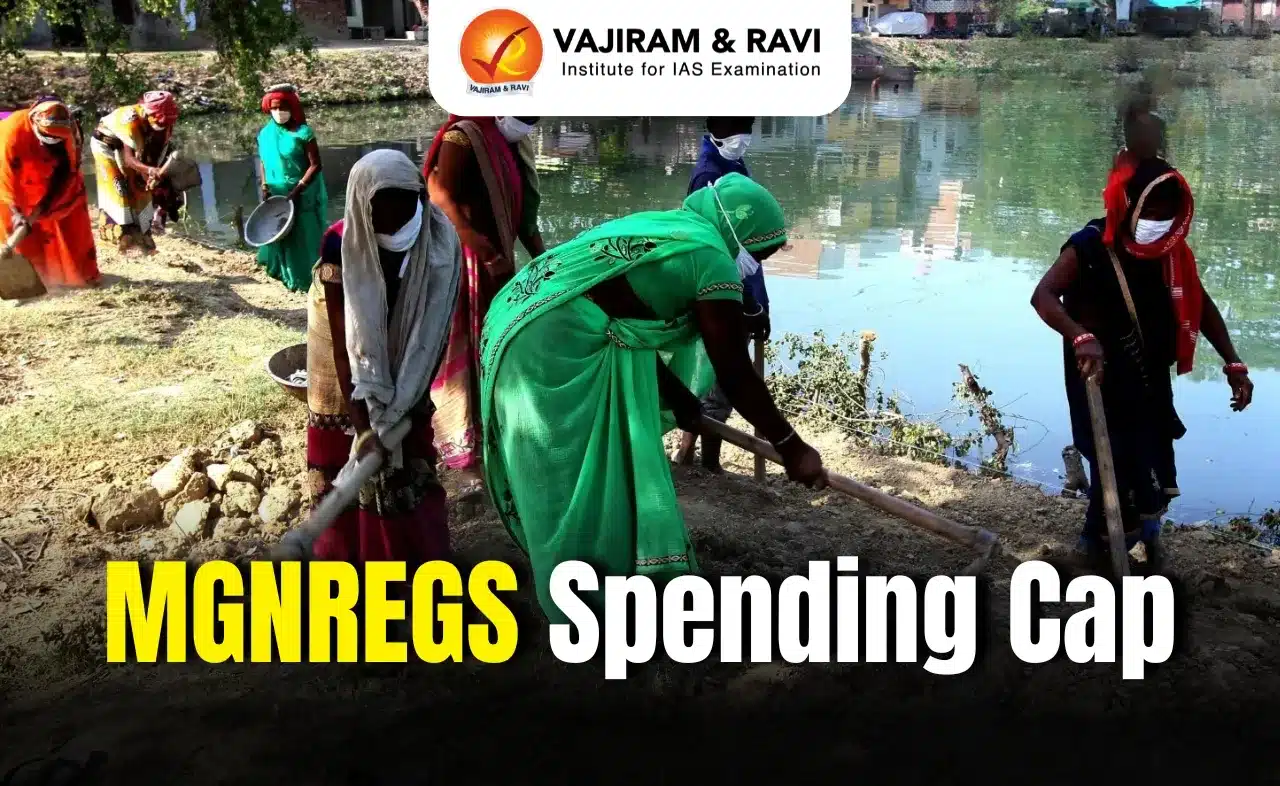What’s in Today’s Article?
- Genome-Edited Rice Latest News
- Genome Editing (GE) in Plants and GM Crops
- ICAR Develops Two Genome-Edited Rice Varieties
- Practical Benefits of ICAR’s New Genome-Edited Rice Varieties
- Significance of the Breakthrough in Genome-Edited Paddy
- India’s Push for Genome Editing in Agriculture
- Genome-Edited Rice FAQs
Genome-Edited Rice Latest News
- ICAR has developed the world’s first genome-edited rice varieties featuring higher yields, drought and salinity tolerance, and improved nitrogen-use efficiency, making them climate-resilient and water-conserving.
Genome Editing (GE) in Plants and GM Crops
- Genome editing in plants refers to making precise, targeted changes to a plant’s DNA without introducing foreign genetic material.
- It uses technologies like CRISPR-Cas9 to edit specific DNA sequences within a plant’s existing genome.
- This can involve deleting, inserting, or modifying DNA at precise locations.
- On the other hand, GM crops involve inserting genes from other organisms into the plant’s genome.
- In essence, genome editing modifies existing DNA, while GM crops introduce new DNA.
- India has exempted GE crops from biosafety regulations under the Environment (Protection) Act of 1986.
- These regulations govern both field trials and release for commercial cultivation in the case of GM crops.
ICAR Develops Two Genome-Edited Rice Varieties
- ICAR has developed the world’s first genome-edited rice varieties—DRR Dhan 100 (Kamala) and Pusa DST Rice 1—to enhance yield, drought and salinity tolerance, and nitrogen-use efficiency, without using any foreign DNA.
DRR Dhan 100 (Kamala)
- Developed by: ICAR-Indian Institute of Rice Research (ICAR-IIRR), Hyderabad
- Parent Variety: Samba Mahsuri (BPT 5204)
- Gene Targeted:Cytokinin Oxidase 2 (CKX2 or Gn1a)
- Technology Used: Site Directed Nuclease 1 (SDN1) genome editing
- SDN1 uses DNA-cutting enzymes (nucleases) to create a targeted break in the DNA at a specific location.
- Key Traits:
- Early maturity (~130 days; 20 days earlier than parent)
- Drought tolerance
- High nitrogen-use efficiency
- Superior yield:
- 5.37 tonnes/ha (vs. 4.5 t/ha for parent) – 19% increase
- Up to 9 t/ha under optimal conditions
- Retains the grain and cooking quality of Samba Mahsuri
- Recommended Zones: Andhra Pradesh, Telangana, Karnataka, Tamil Nadu, Puducherry, Kerala (Zone VII), Chhattisgarh, Maharashtra, Madhya Pradesh (Zone V), Odisha, Jharkhand, Bihar, Uttar Pradesh, West Bengal (Zone III).
Pusa DST Rice 1
- Developed by: ICAR-Indian Agricultural Research Institute (ICAR-IARI), New Delhi
- Parent Variety: MTU1010
- Gene Targeted:Drought and Salt Tolerance (DST) gene
- Technology Used: SDN1 genome editing
- Key Traits:
- Drought and salinity tolerance
- Enhanced yield under stress conditions:
- Inland salinity: 3,508 kg/ha (9.66% higher than MTU1010)
- Alkaline soils: 3,731 kg/ha (14.66% higher)
- Coastal salinity: 2,493 kg/ha (30.4% higher)
- Contains no foreign DNA, comparable to conventional varieties
- Recommended Zones: Same as Kamala – major rice-growing states across India
Practical Benefits of ICAR’s New Genome-Edited Rice Varieties
- Higher Yields, Lower Emissions
- Cultivating DRR Dhan 100 (Kamala) and Pusa DST Rice 1 over 5 million hectares can:
- Increase paddy production by 4.5 million tonnes
- Reduce greenhouse gas emissions by 32,000 tonnes (approx. 20%)
- Cultivating DRR Dhan 100 (Kamala) and Pusa DST Rice 1 over 5 million hectares can:
- Significant Water Savings
- Kamala’s shorter maturity period allows for:
- Three fewer irrigations
- Savings of 7,500 million cubic metres of irrigation water, which can benefit other crops
- Kamala’s shorter maturity period allows for:
- Use of Safe and Award-Winning Technology
- Developed using CRISPR-Cas9 genome-editing technology, awarded the 2020 Nobel Prize in Chemistry
- No foreign DNA used; only native gene edits to enhance traits
- Follows Site Directed Nuclease 1 (SDN1) and SDN2 methods — considered equivalent to natural mutations
- Exempt from Stringent GMO Regulations
- Under India’s Environment (Protection) Act, 1986, SDN1 and SDN2 crops are:
- Exempt from strict GMO rules (Rules 7–11)
- Classified as genome-edited, not genetically modified
- Under India’s Environment (Protection) Act, 1986, SDN1 and SDN2 crops are:
- Regulatory Clearances Granted
- Institutional Biosafety Committees (IBC) of ICAR approved the lines
- Review Committee on Genetic Manipulation (RCGM) cleared them in May 2023
- Declared safe under India’s simplified regulatory framework for genome-edited crops
- IPR Concerns Being Addressed
- Some concerns exist about the Intellectual Property Rights of the genome-editing technology, but ICAR has assured they are being looked into and will be resolved in due course
Significance of the Breakthrough in Genome-Edited Paddy
- Paddy: India’s Most Critical Foodgrain Crop
- Paddy is the main kharif crop and occupies one-third of India’s foodgrain cultivation area.
- It contributes about 40% to the total foodgrain basket, making it essential for national food security.
- Major paddy-growing states include: West Bengal, Uttar Pradesh, Punjab, Odisha, Andhra Pradesh, Telangana, Tamil Nadu, Chhattisgarh, Bihar, and Assam.
- India’s Paddy Production Paradox
- India had the largest area under paddy cultivation (45 million ha) globally in 2020.
- But in production, India ranked second (186.5 million tonnes) after China (211 million tonnes).
- The gap is due to lower yield in India:
- India: 4,138 kg/ha
- World average: 4,717 kg/ha
- China: 7,043 kg/ha
- Indonesia: 5,128 kg/ha
- Bangladesh: 4,809 kg/ha
India’s Push for Genome Editing in Agriculture
- Beyond Rice: Genome Editing in Other Crops
- Genome-editing research is underway for oilseeds and pulses.
- The University of Delhi has already developed a genome-edited mustard variety.
- Government Support and Funding
- The Indian government has allocated ₹500 crore for genome-editing research in agricultural crops to boost yield and climate resilience.
Genome-Edited Rice FAQs
Q1. What is genome-edited rice?
Ans. Genome-edited rice involves precise gene changes using CRISPR, improving traits without introducing foreign DNA.
Q2. Which are ICAR’s new genome-edited rice varieties?
Ans. DRR Dhan 100 (Kamala) and Pusa DST Rice 1 are ICAR’s newly developed genome-edited rice varieties.
Q3. What traits do Kamala and Pusa DST Rice 1 offer?
Ans. They offer higher yield, drought and salinity tolerance, and better nitrogen-use efficiency.
Q4. How is genome editing different from GM crops?
Ans. Genome editing modifies native DNA; GM crops insert foreign genes from other organisms.
Q5. Are genome-edited rice varieties regulated like GMOs in India?
Ans. No, they are exempt from GMO regulations under India’s Environment (Protection) Act, 1986.
Last updated on June, 2025
→ UPSC Notification 2025 was released on 22nd January 2025.
→ UPSC Prelims Result 2025 is out now for the CSE held on 25 May 2025.
→ UPSC Prelims Question Paper 2025 and Unofficial Prelims Answer Key 2025 are available now.
→ UPSC Calendar 2026 is released on 15th May, 2025.
→ The UPSC Vacancy 2025 were released 1129, out of which 979 were for UPSC CSE and remaining 150 are for UPSC IFoS.
→ UPSC Mains 2025 will be conducted on 22nd August 2025.
→ UPSC Prelims 2026 will be conducted on 24th May, 2026 & UPSC Mains 2026 will be conducted on 21st August 2026.
→ The UPSC Selection Process is of 3 stages-Prelims, Mains and Interview.
→ UPSC Result 2024 is released with latest UPSC Marksheet 2024. Check Now!
→ UPSC Toppers List 2024 is released now. Shakti Dubey is UPSC AIR 1 2024 Topper.
→ Also check Best IAS Coaching in Delhi





















